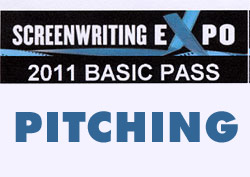 Pitching Tips
Pitching Tips
The Golden Pitch Festival
The Screenwriting Expo hosts something called the Golden Pitch Festival. You have to pay extra for it, even if you have an Expo Gold Pass, but being able to pitch is worth its weight in… well you know.
If you’re an unrepresented writer, it’s the easiest way to get face-time with the people who can actually help you get your movie made, give you representation, or hire you for a writing job.
The following pitching tips come from my own experiences (both pitching and public speaking), and from the training seminars I’ve taken.
I’ve decided to split this article into 3 parts, starting with:
Before you get to the Pitch Festival…
Pitching Tip #1: Make sure you have a logline
A logline consists of one or two sentences (one is better) that captures the premise of your script in the most compelling way.
If you don’t have a logline for your script, it probably means either A) your script is unfocused, or B) you haven’t been writing long enough to understand its importance.
Both are red flags to producers and managers.
Pitching Tip #2: Make sure you have a one-sheet
A one-sheet is something that you can leave behind when your pitch is complete. At minimum, it should have the title, genre, logline, a brief synopsis, and your contact information on it.
Optional items:
- A catchy tagline for your movie
- Loglines from other scripts you have completed (I don’t personally put these on there as I feel they dilute the focus of the current script I’m trying to sell)
- A very brief bio (if you have experience relevant to your script, or have won some awards, or have a Master’s Degree in Screenwriting from USC, etc.)
- A terrific quote from a respected industry reader or someone recognizable in the industry about your script
- Hire a graphic designer to create a professional and memorable one-sheet for you on nice paper/cardstock
And remember, make sure you spell everything correctly! I met a woman at the Expo who had been handing out one-sheets with a misspelling in her title for several days.
Pitching Tip #3: Figure out the structure of your pitch
Yes, your pitch should have a rough structure. It should be something like this:
- Genre your script falls into (e.g. Action, Comedy, Action-Comedy, Thriller, Pscyhological Thriller, etc.)
- Time period of your story (only necessary if it doesn’t take place in the present or if the title begs the question)
- Primary location(s) of your story
- Title, then Logline; OR Logline, then Title (often times the Title can serve as the “punchline” to the logline, so make sure you have a good one)
- Additional info to drive home the concept. For example: “It’s a modern day take on The Legend of Zelda.” Or “It’s Taken but with a brother and sister, instead of a father and daughter.” (That actually sounds pretty good)
- High level story beats (notice I didn’t say “plot”). This will be the “meat” of your pitch.
The reason you don’t just launch into the story beats is because you want to orient the producer/manager as quickly as possible, and provide a context, to the world of your story.
Pitching Tip #4: Make sure you practice your pitch
We all have varying speaking abilities. Some people seem to have been born with the gift of gab (Quentin Tarantino), the rest of us have to work at it. Regardless of where you fall on the scale, you need to spend some time practicing your pitch.
Some of the best practice can come from just chatting up your friends about your script. Don’t tell them you’re pitching it to them, because it immediately sets up a weird dynamic. Just say, “Hey, have I told you about my latest script?”
Then try to sell them on it. Pay attention to what they respond to, and what they don’t, then incorporate the good stuff into your final pitch.
Pitching Tip #5: Make sure you time your pitch
Whether you practice your final pitch in front of other people, or just rehearse it quietly to yourself, you absolutely need to time it with a stopwatch. Yes, a STOPWATCH! If you don’t time your pitch out in advance, you WILL run out of time (5 minutes).
I wouldn’t recommend filling up the entire 5 minutes either. Remember, pitching is interactive and “in the wild.” Crazy stuff will happen that will chew up your time unexpectedly. And you will almost certainly be interrupted by the producer or manager with questions or comments.
It’s best to plan for a pitch that’s around 3 minutes. 4 minutes tops! That way you can go into your pitch relaxed and not worry about the seconds ticking away.
Pitching Tip #6: Study up!
Pilar Alessandra has a great interview with the pundit of pitch-prep, Danny Manus. You can check out that podcast here.
If you have several months before your next opportunity to pitch, why not join a Toastmasters International club in your area? I’ve seen it work wonders for people who were previously crippled by the idea of pitching or public speaking.
—
Any other pre-arrival pitching tips you’d add?
Next Edition: Pitching Tips Part 2 — When you get to the Pitch Festival…
Previous Screenwriting Expo 2011 Posts:
– First Impressions
– How do you get a Manager?
– Top 20 Agent Tips





I was one of those ones who was crippled by the thought of pitching and/or public speaking. I wasn’t planning on pitching, but I took a boot camp class just to find out what I needed to prepare for next year.
Turns out, the boot camps are pitching speed dates! Was NOT expecting that. Was initially terrified, first from the prospect of just doing it, but secondly because I had NOTHING to pitch.
But it turned out to be a fantastic experience. I found that I was pretty good at pitching, and wasn’t nervous at all (just a wee wee wee bit, but more than manageable). Over the course of the session, each person was the pitcher and the “executive” hearing the pitch about five times each, so by the end you heard or gave ten pitches.
I really can’t recommend this enough. And it’s so easy, you can really just get a group of your writing friends together (assuming you’re somewhere that has a group of writers) and do this same thing. The speed of going from table to table, sometimes as pitcher and sometimes as executive, really takes the edge off your nerves. I was really shocked at how not nervous I was, because “crippled” is a great word to describe how I approach these sorts of things. But hearing other pitches and figuring out what worked or didn’t work, and then getting to do your own right after it really helps you work out the kinks.
I ended up pulling a completed web series pilot out of my butt as my “TV series pitch”. Even though I wasn’t prepared, I knew the pilot and the series bible well enough to pitch it like I came in there ready to pitch. That’s the ultimate secret is that you just have to know your story inside and out and be able to answer any question, with passion.
Finally, five minutes (especially to those of us terrified at pitching/speaking) may SEEM like an eternity, but it’s next to nothing. As stated, really you only have about two or two and a half minutes to actually pitch your idea, and the rest you NEED to leave for questions.
Bottom line, it doesn’t matter how much public speaking terrifies you, I know that I probably have you beat, but I was able to do it (at least in pretend mode) with no problem. Just practice and know and love your story to the depth of your soul and you’ll do great.
Great insight and recommendations Vic. The more you do anything, the better you get at it. I had heard from some people who claimed they didn’t get anything out of the boot camp, so it’s terrific to hear a positive testimonial.
And yes, I forgot to mention one of the most important things — know your story inside and out! If it’s been a few weeks since you’ve read your script, then you had better read it again.
Also, it’s good to anticipate common questions you may be asked (and have winning answers ready), such as:
– This script isn’t for me. What else do you have?
– Who do you picture in the lead role?
– How many scripts have you written?/How long have you been writing?/What’s your background?
– How far along are we into the script at this point in the story?
– How does it end?
– What movie is it like?
Thanks Vic!
A few more thoughts to add on to original diarist’s…
1) Yes, practice practice practice. Then UN-practice. I found that memorizing the pitch like a monologue (actor, here) was great, but it also started to take some freshness out. For my last few pitches. I stopped ‘rehearsing’ for a half hour or so before the pitch. In fact, I haven’t look at my pitch since the Expo, and I bet I could not only deliver it now, but it would seem more natural and off the cuff.
2) The best pitch is, like, a minute. Seriously. And you can only do a one minute pitch with a super high concept movie. My initial pitch script won one of the competitions, but it’s a really complex, hard to pitch film. It’s nuanced and multi-layered, which makes for an awesome read, but a horribly hard pitch. I completely struck out at least 3 times trying to pitch it. I finally kept tweaking the pitch to where I gave enough info about the story, but really tried to sell the atmosphere of it. But yeah, 3 pitches really hated me. I still feel their icy glares…
What pitch really worked? My simple high concept script I can deliver in a minute. In fact, I was having some drinks Friday night with some writers at the Expo, lamenting my horrible day. I mentioned I have this other script I’m almost done with. They said, what’s it about. I told them in 3 sentences and they were all like, “Um. That’s perfect. Just do THAT tomorrow.”
3) For timing the pitch I used a cheap app called ‘pclock’ or ‘presentation clock.’ It’s perfect.
4) Other questions I heard:
What’s the budget?
Who makes this?
Who directs this?
What sort of universal human themes does this touch on?
5) TV material excites managers. They love it if you have tv in your arsenal (or they seemed to light up when I mentioned that I did). I guess they like TV writers (or people who can do both) because its a steady, high paying paycheck for everyone.
zuckerman — Yeah, the simple high concept pitches are the best. Actually the main one I was pitching this year I aimed for about a minute, then either answered questions for the rest of the time, or dove into plot (beats) if asked.
If you have a comedy script, you need to take more time with the pitch. Producers/Managers want to get a feel for the flavor of the script. And in that case you’d better be able to make them laugh.
I agree, more nuanced scripts, like the one you alluded to, are more difficult to pitch, and will usually take longer. In those cases, I still wouldn’t try pitching the plot, but instead would focus on the set pieces.
Great additional questions! You’re right, I’ve been asked most of those too.
Good point about the TV material for Managers.
Excellent feedback as usual zuckerman, thanks!